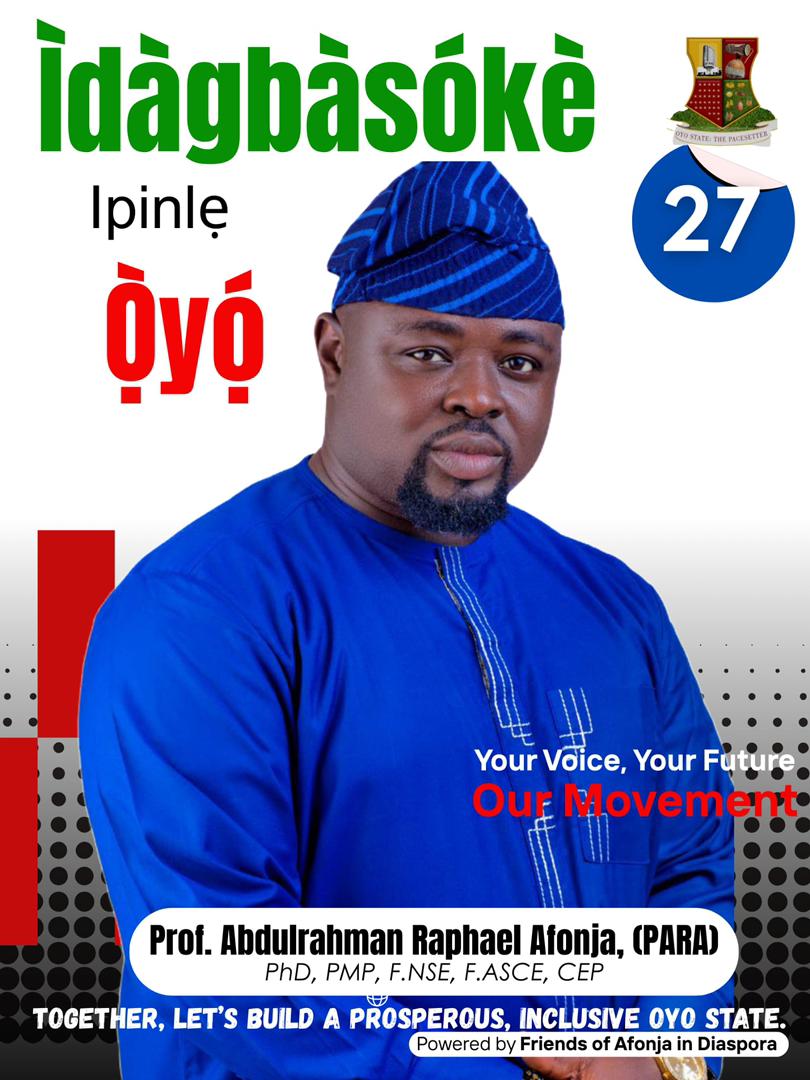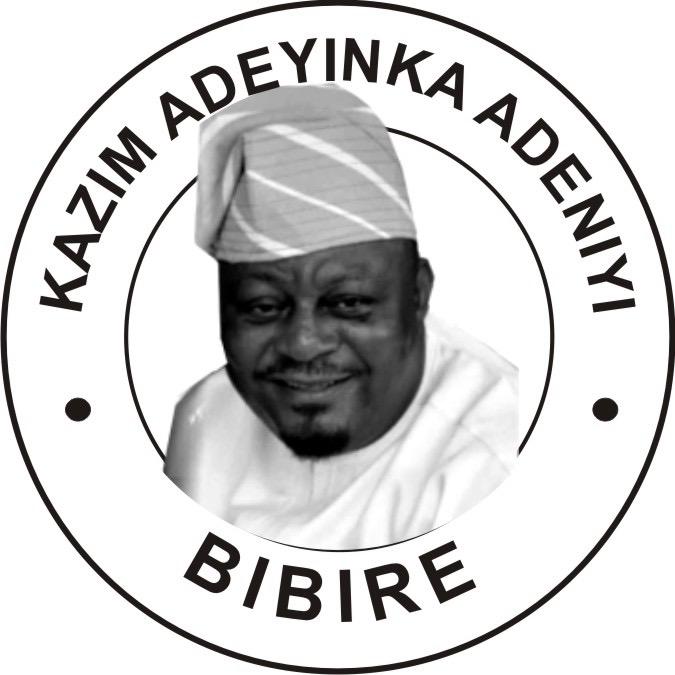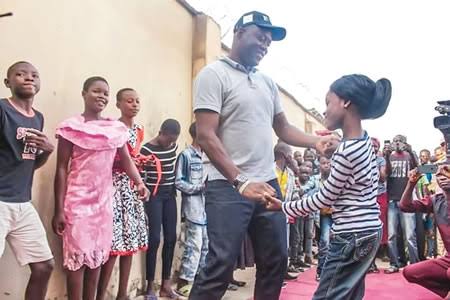Makinde As Jogbo’s Dancer By Oladeinde Olawoyin
A story looms not in Tunde Kelani’s Jogbo, but in Ibadan. It’s about a man who doesn’t exude the dreadful aura of Olóólù, nor the sartorial elegance of the jacquard-wearing Jáláruru. He doesn’t possess the bravura of Alápánsánpá, nor the dancing theatrics of Ògbònkoko. He certainly can’t pull the fire-twirling stunts of Dánáfojúraá, neither can he tumble through extreme acrobatics like Sodo in Ita-Ege. Yet like a skilled masquerade, he is scheming to dance his way back to the government house in Agodi in 2023.

Now that is the story, but it is not the entire story.
In Ibadan, Governor Seyi Makinde faces the biggest political pressure of his life. Those who think they made him governor within his party are threatening fire and brimstone. Those who think he has failed within the opposition party are calling for his head. Those who think he has done excellently well within and outside his party are standing solidly behind him. All three groups are asking the governor to obey the same command: run, run, run! But the force and direction of the command is a function of where each group stands: the first wants to run him out of town; the other wants to force him to run out of the government house; the last group wants him to run again for governor in 2023.
So the story is about running, but it’s also about something else.
When Hazeem Gbolarumi, Bisi Olopo-Eniyan and other aggrieved PDP leaders passed a vote of no confidence in Makinde in September, they reeled out their grievances, and this writer was quite amused. They had little or nothing to say about education, or health, or budget, or Oyo’s debt, or basic infrastructure. They focused on another form of infrastructure. And since they are politicians, it was no surprise the demands were stomach-related. This writer only felt at the time that it was important to separate the chaff from the wheat; to let Oyo people know the difference between public interest and personal feuds packaged as demand for public good.

Since the PDP leaders went for the jugular, Makinde has trounced them several times in battles within the party. In the state congress, the governor had his disciples elected into executive positions. He would go ahead to wreak more havoc at the regional and national levels, making a mess of the records of heavyweights like Oyinlola and Fayose, and effectively taking control of the party. But the Oyo PDP gladiators have vowed to deal with the governor at the 2023 polls. They say they owned the party structures; that they gave him the shoes with which he ran in 2019. They say they will remove the shoes from his legs. That way, they will make him shoe-less, a la Goodluck Jonathan, and he won’t be able to dance to Agodi in 2023. In a sense, the PDP gladiators are local descendants of folks Dr. Reuben Abati described as “shoe-givers” during the Jonathan years.
So the story is about Makinde’s shoes and the art of dancing, but it’s also about something else. It’s about Jogbo, the fictional town in Tunde Kelani’s classic, Agogo Eewo, and how art mirrors life.

In Agogo Eewo, through the lens of the late sage, Adebayo Faleti, Kelani tells the didactic story of Areku the dancing masquerade. An excellent dancer, Areku borrowed a pair of shoes from two “shoe givers”, set out to a party, danced to the delight of everyone, and became the star of the show. When the ovation became loud, the jealous “shoe-givers” decided to spite Areku. In the full glare of everyone, they forcefully took the borrowed shoes from the dancer. Defying the humiliating episode, Areku continued to dance bare-footed, although it was quite a painful dance. But the crowd of excited villagers who saw how the “shoe-giving” cabal attempted to humiliate Areku would soon come forward to donate shoes to the dancer. In the end, by defying the cabal and dancing for the people, Areku took ownership of numerous new shoes donated by the villagers.
Kelani, ever the perceptive cinematographer, deployed this episode as a lesson-filled dream for the king of Jogbo, who was torn between two extremes: dancing to the tune of a band of corrupt chiefs, or pandering to the desires of the ordinary people. As Areku’s story showed, the ideal is to satisfy public good because that’s where the ultimate victory lies.
So the story that looms is about Governor Makinde’s dilemma, and whether he performed and can dance, like Jogbo’s famed dancer-masquerade, Areku. But since perception is more potent than intention, especially in politics, that’s not the entire story.
Many people within the opposition APC in Oyo state often claim that the governor hasn’t done anything. I do not agree with them. Many within the PDP are often quick to regale us with tales of how Makinde has turned Oyo into an eldorado, almost literally. I disagree with them vehemently, too.
The truth for me is hidden midway between claims of unparalleled performance and tales of complete failure, and how dispassionate appraisals can help shape growth and development, irrespective of partisan inclinations.
In August, I was at Mapo and saw how a mountain of filth, waste, and fecal materials welcomed visitors into the iconic hall. But I reckoned at the time that Mapo was a metaphor for the entire city, anyway. That month, I wrote on this page that Ibadan stinks. Soon, I ran into Lamidi Auxilliary and his Wulo Wubo gang, and I wrote about that murderous mob, the support it enjoys from Makinde government, and how it threatens societal peace. I later drove around Ibadan and it was as though the entire city fell into craters and potholes. There have also been concerns about pupils writing exams on chalkboards, schools with roofs blown off, flood-ravaged neighborhoods, and related issues.
The other day, some tweeps came to town with screenshots of how Oyo debt figures have reduced and how Makinde delivered on infrastructure without borrowing a penny. I wrote a piece to clear the air about Oyo’s Alternative Project Funding Approach (a PPP arrangement) and the disturbing state of some of the projects tied to the AFPA, like the arena of flood in Adamasingba. But some bejeweled dingbats took to name-calling. I also reached out to aides who were initially willing to speak up but quickly declined upon seeing the focus of my question.
So the story is about rot, window dressing and uncertainty, but it’s also about something else.
Makinde brought a kind of simplicity that endears to that office. It could get worrisome whenever the results show up in citizens’ complacency but this simplicity fascinates, still. Like I wrote of Ajimobi’s commendable attempt to “intellectualise” that office in the wake of the departure of the Amala crowd, those who value optics would appreciate Makinde’s. Away from optics, he has handled the LAUTECH issue quite commendably well thus far, responded swiftly to the plight of traders in Akesan market, been fair in the spread of projects across the state, done a half-hearted surgery on the state’s park management system to improve revenues etc. Last week, a friend who should know told me Ibadan is gradually wearing a cleaner look and that a few of the things we bellyached over are being addressed.
So the story is about deliverables, but it’s still not the whole story.
I’m perhaps one of Governor Makinde’s loudest critics. And the conviction for me is simple: while I do not agree at all that the governor is a do-nothing mannequin as the opposition often claims, I equally find the degree of propaganda and lies some of his people share in the name of PR quite galling. And because I have a stake in that state where there now seems to be very few or no independent entities dissecting issues dispassionately, I seek the truth independently, warts and all.
So the story that looms in Ibadan is about vanities like the 2023 elections, but it’s also about bigger things, like what the future holds for Oyo, and for Makinde as its helmsman. Despite pretensions to transparency, Oyo hasn’t been quite forthcoming with much of its (debt, APFA, finance etc) records, and so we may not even know where it stands as we speak. But even if we don’t know, posterity does.
Today in Ibadan, there is a chaos of claims, all with variegated twists and turns. The teachers are threatening a showdown next week. Makinde’s government says they are not being truthful. The politicians, the media, the workers, and the people are all saying different things, depending on individual allegiances. Their stories are all important, but not as much as that of posterity. In this same Ibadan, Lam was considered a hero among pro-democracy activists; Ladoja was the “darling” of civil servants; Alao-Akala was the “road construction wonk” among revelers at Oyato joints; and Ajimobi was even labeled “architect of modern Oyo State”. Whether they lied to themselves and the people or not, posterity has finally pushed all of them into their rightful positions in history book.
Political scientists have proven it over time that perception, not performance, determines electoral contest. The number of roads done or undone, the schools built or left in ruin, the money incurred as debt or looted from treasury—–what they all mean in the context of development is a matter of perception.
So the ultimate story that looms isn’t even about 2023: it’s the story of Makinde and his date with posterity. Politicians lie, workers lie, party supporters lie. The ordinary people, if carried away by the frenzy of the moment, can lie to themselves too. Of course, the media lies! Only posterity lies not.
So let the governor do or say whatever he likes to politicians, media, civil servants, or even the ordinary people. But let him be truthful to posterity, because it doesn’t lie.
*****
Oladeinde tweets via @ola_deinde
...For the latest news update, Subscribe to our Whatsapp Channel (Click Here) and join our Telegram Update Group (Click Here)

You can also advertise your Product and Services on our page for more patronage
Contact us today by sending your Stories, Articles, Events, and Eyewitness Reports for publications as well as products and services for advertisement to westerndailies2018@gmail.com or WhatsApp (+2348058448531) for more information






